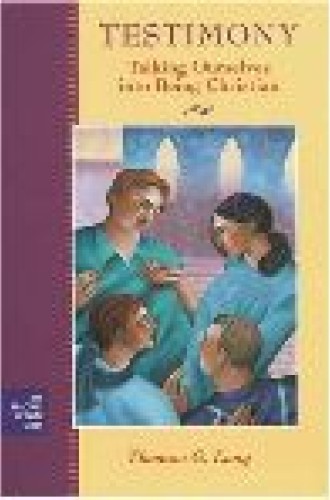Testimony: Talking Ourselves into Being Christian
Evangelical Christianity is generally loquacious; Minnesota Swedes seldom are. My Swedish evangelical paternal grandparents talked little about their deeply held faith, and then only in sober tones. They would have benefited from reading Thomas Long’s groundbreaking book, the fifth volume in the Practices of Faith series. Dorothy Bass, editor of the series, notes that “people wonder whether it is ever possible to talk about religious beliefs without becoming arrogant—or dying of embarrassment.” It was arrogance that my grandparents feared. Long shows how a person can talk about faith without arrogance or embarrassment in an age when religious talk is often considered cheap, shallow and self-serving.
In the first and the leaner of the book’s two parts, “The Hunger for Authentic God Talk,” Long argues that Christians—he means nonpreachers and nontheologians—need desperately to talk about their faith, that they can do so with authenticity, and that worship more than anything else equips them to do so. It is here that Long unpacks the book’s enigmatic subtitle, “Talking Ourselves into Being Christian.” Talking about faith is not something you do only when you have all your theological t’s crossed and i’s dotted; rather, you talk on the way toward deeper faith, and the very act of putting words to your faith shapes and grows it. Using the analogy of two lovers, he writes: “Putting their love for each other into words gives it a content, a shape, a definition, a depth, and a future it did not have when it was just a formless emotion surging wildly in their hearts.”
Long affirms that worship, more than any other part of the Christian life, gives to the faithful the words and courage they need to speak their faith. This invites the question he addresses in the second part of the book, “Talking Through the Day”: How do the faithful translate the often private Christian language of scripture, liturgy and preaching into the language of a world increasingly unfamiliar with our spiritual dialect? Long uses five times of the day to address the specific contexts in which Christians struggle to articulate their faith. In one chapter he discusses the challenge of witnessing to faith in the workplace; in another, a long and especially helpful chapter called “The Six O’clock News,” he explores speaking about faith in the political realm.
This is not an evangelism-techniques manual; indeed, Long argues that one of the problems we face in talking about faith is our listeners’ suspicion that we are out to win converts and thus validate our own faith. Long illustrates this central point with a memorable story. Once, when he and his wife were watching a sunset that was only a “4 on a scale of 10,” he turned to go back inside. His wife tugged on his sleeve, trying to get his attention: “‘Look, look!’” “The sunset had saved the best for last,” Long recounts, and it “was one of the most stunning we had yet seen.” He then explains: “When my wife urged me to ‘Look, look!’ this was for my sake, not hers. She could see the sunset; I couldn’t, and she did not want me to miss it. . . . So it is with testimony. We see the hand of God at work in life, and we don’t want other people to miss it.”
Long writes as well as he preaches, and in the same manner. Affirmations and assertions are always followed by apt illustrations drawn from literature and experience. The writing is rich and sleek, though marred by an unusual number of typographical and copyediting errors. Long’s imagined readers may be believers in the pew rather than preachers, but as a preacher myself, a weekly giver of testimony, I found treasure in these pages for pulpit days as well as for the other six.





